Activists Say International Pressure Needed To Stop Executions In Iran
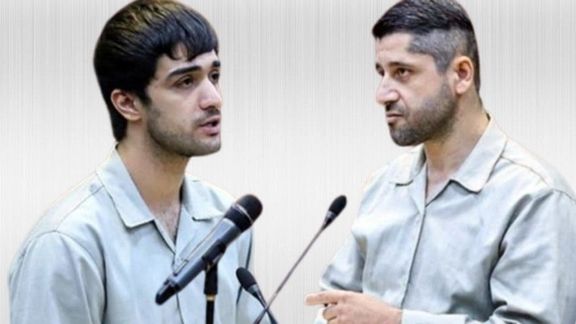
Iranian rights defenders say that if the world does not put more pressure on Iran's regime, it will kill more protesters after two young men were hanged Saturday.

Iranian rights defenders say that if the world does not put more pressure on Iran's regime, it will kill more protesters after two young men were hanged Saturday.
The Oslo-based Iran Human Rights Organization called the execution of Mohammad Mehdi Karami, 22, and Mohammad Hosseini, 39 was a "criminal act" and warned of "massive executions of protesters" if there is no "adequate response from the international community".
Both men were arrested for the killing of a Basij militiaman named Ruhollah Ajamian during the protests on November 3 in Karaj west of Tehran.
Canada-based activist Hamed Esmaeilion said in a tweet Saturday that “terrorists of the Islamic Republic murdered two innocent young men without access to the lawyers and behind closed doors. The time has come to expel their ambassadors.”
British-Iranian actress and human rights activist Nazanin Boniadi also condemned the executions saying, “Shame on the global community and leaders for not stopping the Islamic Republic’s atrocities.”
Masih Alinejad, another rights activist, also said in a tweet, "In our occupied land, our loved ones are being executed for chanting for freedom, for protesting against poverty, corruption and brutality."
Two protestors named Mohsen Shekari and Majidreza Rahnavard were executed in Tehran and Mashhad in December.
Following mass arrests of protestors in the last four months and hasty death sentences issued for 11 people in sham trials, human rights activists and some foreign officials have been calling for weeks to hold the Islamic Republic accountable.

Prime Minister Justin Trudeau has reaffirmed Canada's commitment to pursue justice for the “senseless” deaths of those onboard an airliner downed by Iran in 2020.
Trudeau made the comments in a meeting with family members of victims of Ukraine International Airlines Flight PS752 that was shot down by Iran’s Revolutionary Guard on January 8, 2020.
Mélanie Joly, Minister of Foreign Affairs, Omar Alghabra, Minister of Transport and Ralph Goodale, High Commissioner in the United Kingdom were also present in the meeting which was held on the anniversary of the tragic event.
A statement published by Global Affairs Friday said, “Canada honors the victims of Flight PS752 and all air disasters and continues to stand in solidarity with their families and loved ones.”
“Canada and its partners in the Coordination Group—Sweden, Ukraine and the United Kingdom—continue to work together to hold Iran accountable for the downing of Flight PS752 and ensure full reparations are made for the deaths of 176 innocent people,” reads the statement.
On December 28, 2022, the Coordination Group of countries affected by the tragic incident announced an important step in the pursuit of accountability in accordance with international law. Members of the group Britain, Canada, Sweden, and Ukraine urged Iran to agree to arbitration as Tehran has stonewalled over an independent investigation and proper compensation.
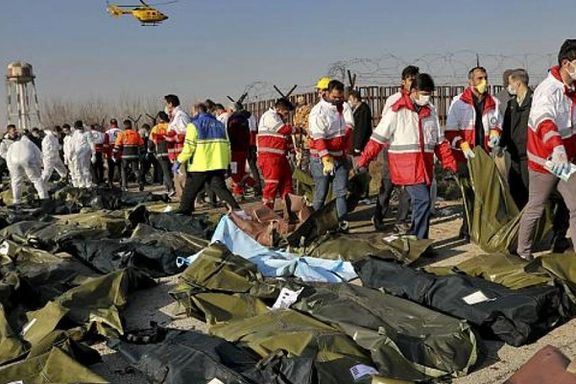
The airliner was shot down by two air-defense missiles fired by the IRGC as it took off from Tehran’s Imam Khomeini International Airport. Hours earlier, the IRGC had fired more than a dozen missiles at Iraqi bases hosting US troops in retaliation for the killing of the IRGC Quds Force Commander Ghasem Soleimani who was targeted by a US drone strike just five days earlier.
All 176 passengers and crew, including 63 Canadians and 10 from Sweden, as well as 82 Iranian citizens on the plane died in the disaster.
Iranian activist groups have called for large rallies both in Iran and abroad on Sunday, January 8 to mark the third anniversary of the incident, coupled with ongoing antigovernment protests.
The execution of two more protesters in Iran on Saturday may add to the intensity of the gatherings on Sunday.
The Canadian Broadcasting Corporation reported January 6 that Ottawa is weighing the options regarding claims that Iran’s envoy to International Civil Aviation Organization (ICAO), Farhad Parvaresh might have had involvements with Iran’s Revolutionary Guard.
Parvaresh is currently based in Canada and some are demanding that the federal government impose restrictions on his movements.
Parvaresh was the head of government airline, Iran Air during the years when the company’s aircraft were used to transport weapons to Syria, a task organized and controlled by IRGC’s extraterritorial Quds (Qods) Force.
In a confidential audio recording obtained by Iran International in April 2021, former foreign minister Javad Zarif told an Iranian journalist that Iran Air was extensively used to ferry weapons to Damascus. The authenticity of the long audio recording was not disputed. Zarif’s reference was to early and mid-2010s, when Parvaresh headed Iran Air.
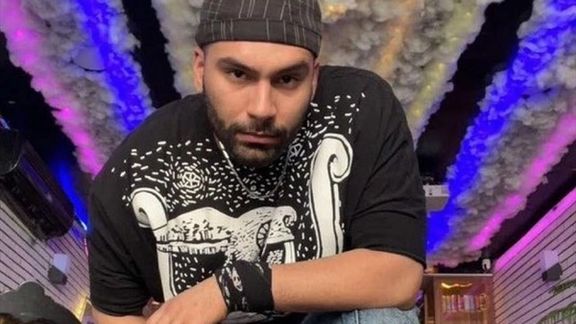
Dozens of Hollywood stars including Cate Blanchett, Jason Momoa, and Samuel L. Jackson, have called on Iran to stop executions of imprisoned protesters.
In this video, which was released on Friday, they said "We stand with the people of Iran in their fight for freedom. Thousands of protesters have been arrested. Some have already been executed. Many more are in danger, but the world is watching."
Just one day after the message by Hollywood stars, the clerical regime executed two more protesters Saturday morning, bringing the total to four in one month. Mohammad Mehdi Karami and Mohammad Hosseini were hanged amid international outcry against regime’s brutality. Mohsen Shekari and Majidreza Rahnavard had been hanged earlier.
This video messagewas produced in collaboration with Iranian-American screenwriter Nicole Najafi.
Najafi wrote on her Instagram that execution of protesters is the regime’s “last ditch effort to save themselves and terrorize their own people into submission. But Iranians will not back down.”
The Oslo-based Iran Human Rights Organization says at least 100 of the arrested protesters are at risk of receiving death penalty or being executed.
Since September 16 and following the death of Mahsa Amini in the custody of Tehran's morality police, Iran has been the scene of widespread protests, which have been met with violent repression by the Islamic Republic's security forces.
The execution of four Iranian protesters took place following hasty trials and without observing due process, which has provoked public anger in Iran and has been condemned by many around the world.
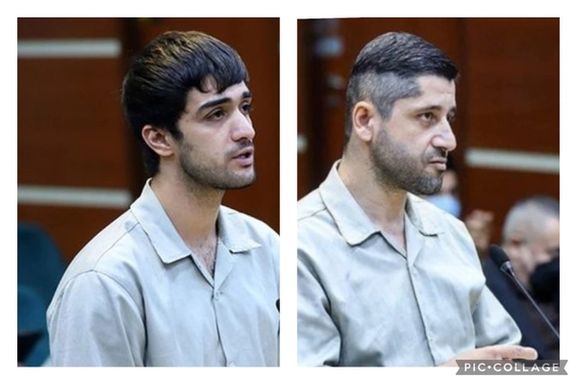
The clerical regime in Iran hanged two men on Saturday for allegedly killing a Basij agent during antigovernment protests near the capital Tehran in October.
"Mohammad Mehdi Karami and Seyyed Mohammad Hosseini, main perpetrators of the crime that led to the unjust martyrdom of Ruhollah Ajamian were hanged this morning," the judiciary said in a statement carried by the official IRNA news agency.
Karami was 22 years old, and Hosseini 39 were tried without having access to attorneys of their choosing, as almost all other dissidents and protesters arrested during the demonstrations. The circumstances related to the killing of Ajamian are not clear, as often the Basij paramilitary forces take the lead to attack protesters and use deadly force.
The convictions were not based on a criminal charge related to the murder per se, but they were charged with ‘moharebeh’, meaning “war against God”, a vague religious concept. The Islamic Republic applies the charge to people who might get into a confrontation with security forces during protests.
“I met with Seyed-Mohammad Hosseini at Karaj Prison. He cried through his account of tortures, being beaten with tied hands and legs and blindfolded, to being kicked in the head and losing consciousness, the soles of his feet being beaten with an iron rod to being tased in different parts of the body,” Ali Sharifzadeh Ardakani who says he has just recently been allowed to represent Hosseini tweeted on December 18.
Despite widespread international attempts to stop the executions, the regime decided to implement the verdict reached in November. Officials say death sentences for three others in the same case have been canceled.
So far, the government has executed four protesters and eleven others have received the death penalty, some for much less charges than murder, while at least 100 protesters face charges that could end in death sentences for them, an Iranian human rights group based in Oslo has reported.
The first two hangings triggered strong international condemnations and hundreds of lawmakers in Europe and Australia began sponsoring Iranian detainees in danger of execution to generate publicity and impact their fate.
French lawmaker Aude Luquet had taken on Hosseini’s political sponsorship and called for an immediate halt to all executions in Iran. Hosseini is also sponsored by Austrian parliamentarian Harold Truch.
Mohammad-Mehdi Karami was sponsored by Helge Limburg, member of the German parliament. “The regime in Iran assumes that he was involved in a killing. In truth he should die because he stands up for democracy and human rights. His execution would be a judicial killing,” Limburg tweeted December 12.
Activists had earlier called for protests in Iran and abroad on Sunday, January 8, the third anniversary of the downing of a Ukrainian airliner over Tehran by the Revolutionary Guard that killed all 176 people onboard. The executions on Saturday will add fuel to people's anger and big protests can take place as early as today.
Dozens of prisoners are either on hunger strike or suffer from life-threatening illnesses that are not treated by prison authorities and some are deprived of life-saving medications.
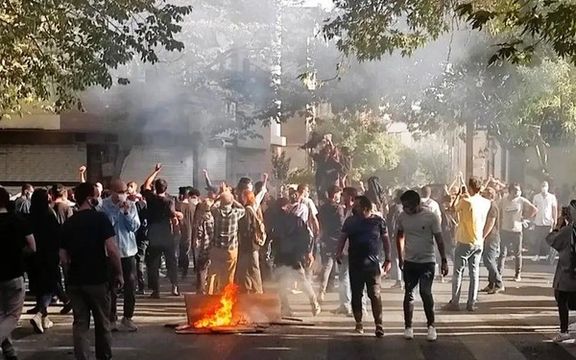
An audio file shared on social media has revealed that the regime threatens Iranians abroad for taking part in anti-government protests and expressing opposition.
In the audio file published by the VOA Farsi service on Thursday, a security agent of the Islamic Republic, who introduces himself as an agent of the intelligence ministry, threatens "Massi Kamri", an Iranian activist living in France, saying if she does not stop acting against the regime, they will imprison her parents and family members in Iran.
Apparently, she participated in rallies against the Islamic Republic’s bloody crackdown on antigovernment protests that have engulfed Iran following the death in custody of 22-year-old Mahsa Amini.
Using an insulting tone, the agent tells Kamri if she cares about her family and does not want them to be taken to the notorious Evin prison in Tehran she should not engage in anti-Islamic Republic activities.
The agent also says she must stop sharing Instagram stories and posts that encourage people in Iran to chant slogans and hold protests.
In another part of the recording, Kamri says her Instagram page is private and no one except her followers could see her posts, but the person from the intelligence ministry claims he has access to her page, saying “it’s right now open in front of me!”
Kamri insists that she has not done anything wrong according to the laws of France, where she is a permanent resident, but the agent says what she is doing is against the Islamic Republic. She told the regime’s agent that nowhere in the world do authorities hold accountable the family members of someone who commits a crime, but the agent replied this is Iran and they can do whatever they like.
This is not the first time Iranian agents threaten people living abroad for expressing their opinions. The Daily Telegraph recently reported that the Islamic Republic uses mosques and political institutions in the United Kingdom as part of its “spying system” to target dissidents.
Canada's spy agency also launched an investigation into what it calls multiple "credible" death threats from Iran aimed at individuals in Canada.
In November, Israel’s Mossad informed Britain’s spy agency about an impending Iranian plot to carry out terrorist attacks against Iran International’s journalists based in London.
According to information obtained by Iran International, threats against its journalists came from the same team that sought to target Israel’s former consul general in Istanbul, Yosef Levi Sfari, who was rescued by authorities and sent back to Israel.
Faced with nationwide antigovernment protests since mid-September, the Islamic Republic has blamed foreign-based Persian broadcasters such as BBC Persian and Iran International of “fomenting unrest”, while all media in the country are under tight government control and present protesters as “rioters” and “terrorists”. The Islamic Republic is notorious for tormenting the families of dissidents in every way it can think of, from abducting the bodies of the dead ones and burying them in undisclosed locations -- such as the case of late journalist Reza Haqiqatnejad -- to detaining and calling in family members for interrogations to warn them of talking to media about their loved ones.
Iran’s Intelligence Minister Esmail Khatib on November 9 said the Islamic Republic regards Iran International as “a terrorist organization,” adding that its workers and anyone affiliated with the channel will be pursued by the Ministry of Intelligence.
Iran has a long record of targeting dissidents and independent journalists who found refuge in other countries. In the latest example of terror operations abroad, Iranian intelligence abducted dissident journalist Ruhollah Zam who was visiting Iraq in 2019 and took him back to Iran where he was executed in 2020.
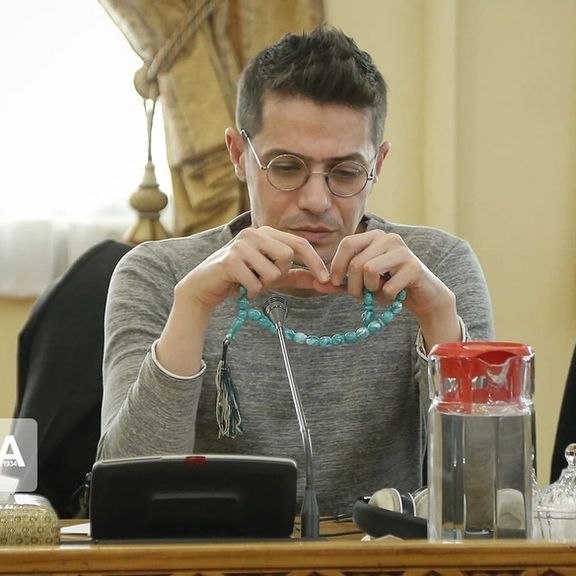
The Islamic Republic has arrested another journalist, bringing the number of detained reporters and photographers over the ongoing protests to well over 70.
Mehdi Beyk, the political editor of reformist Etemad newspaper, was arrested on Thursday.
Earlier in the week, the regime’s security forces arrested two other journalists -- Mehdi Ghadimi and Milad Alavi, both working for reformist media outlets.
On Sunday, regime’s agents raided the house of Mehdi Ghadimi’s father in Karaj, west of Tehran, and arrested the journalist who used to work for several dailies in Iran including Etemad and Shargh, both ‘reformist’ publications.
Tehran Journalists Association says at least 73 journalists and photographers have been arrested in the past four months, around the time when 22-year-old Mahsa Zhina Amini was killed in police custody triggering the current wave of antigovernment protests.
Niloufar Hamedi, Elaheh Mohammadi, Nazila Maroufian, the three journalists who broke the news of her death, covered her funeral and interviewed her father were also arrested.
The Brussels-based International Federation of Journalists said in mid-December that at least 57 journalists had been arrested in Iran since September. The international NGO also noted that only 30 of the 57 detained journalists have been reportedly released so far.
There are no exact figures on the number of people arrested during the protests, but some sources say nearly 20,000 people have been detained, more than 500 killed by security forces and many received serious injuries, such as losing their eyes when they were targeted by shotguns.